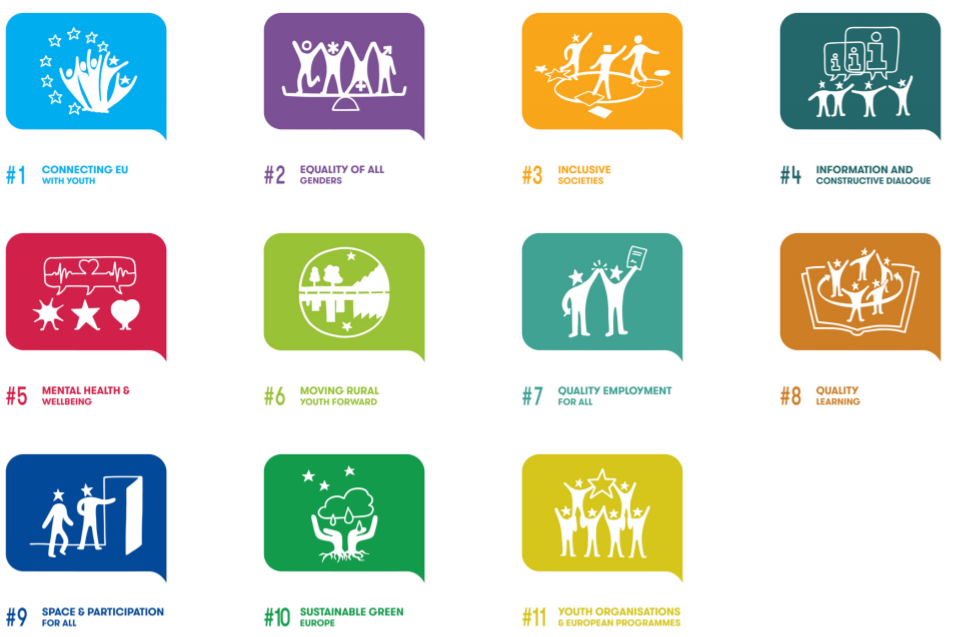In 2018, about 50,000 young people participated in a survey that was held Europe-wide. The results from this survey birthed the 11 youth goals. Every country in the EU took part in the development of the youth goals. The aim was to collect the voices of the youth and come up with goals that reflect their views and represent the vision of the active voices in EU youth dialog1. Below are 11 of the Youth Goals which have been included in the EU Youth strategy.
- Connecting EU with Youth
- Equality of All Genders
- Inclusive Societies
- Information & Constructive Dialogue
- Mental Health & Wellbeing
- Moving Rural Youth Forward
- Quality Employment for All
- Quality Learning
- Space and Participation for All
- Sustainable Green Europe
- Youth Organisations & European Programmes.
 From the list above, this article will focus more on goal 3 – inclusive society. This is because prioritizing inclusive society would make it easy to achieve most of the EY goals listed above.
From the list above, this article will focus more on goal 3 – inclusive society. This is because prioritizing inclusive society would make it easy to achieve most of the EY goals listed above.
Checking every goal on the list will mean nothing if social inclusion is not adequately implemented. The voices of the young people who are minorities, those who live with disabilities amongst others should be heard and they should feel comfortable in any space where they find themselves without any form of discrimination. For example, studies have shown that persons with disabilities are more likely to experience adverse socioeconomic outcomes such as less education, poorer health outcomes, lower levels of employment, and higher poverty rates2. So why is social inclusion not a priority on everyone’s list?
Inclusive societies afford all individuals and groups regardless of age, gender, sexual orientation, ethnicity, race, ability, religion, immigration status, and socioeconomic status access to and full participation in society3. Timely interventions directed at young people are more likely to yield a greater return for sustainable development than attempts to build these capacities later in the life cycle4
Having a society where young people are included and properly represented means that the society allows for equality of all genders as discrimination does not exist in a truly inclusive community. It means young people are informed and are involved in constructive dialogue, their mental health and general wellbeing is accounted for and taken care of. They get access to quality learning and employment. It encompasses the issues and solutions the European Youth Goals aim to achieve.
In other to ensure an inclusive society, it is important that every sector of the economy is well informed about the topic. Young people need to feel accepted in the environment and know that playing their part matters a lot in the grand scheme of things. Employment and empowerment are seen more in societies that are inclusive, the youths benefit from such societies and it ultimately translates to a better world for all. There is a need to ensure that the youth feel safe, welcomed and valued in the community. They need to know that they are capable of doing great, and the society is playing the part by supporting them, because A society that allows its youth to have a voice and be able to maximise their potential is a society set for greatness.
Empowerment through Innovation and Technology for All
With the changing society and world at large, we suggest that if a new EYG is to be added it should be one that covers youth’s participation in innovation and technology. According to Eurostat, In 2019, 94 % of young people in the EU-27 made daily use of the internet, compared with 77 % for the wholepopulation. Young people in Europe have shown great interest in technology and have proven that with empowerment and proper measures that they can own the tech-space. This was evident in the robust list of young Europeans that made it into the 2021 Forbes list under the technology category. Initiatives from the European Economic Area (EEA) and Norway Grants to support transnational projects for Youth Employment including European Digital Bootcamps (EDIBO) contribute to increase the job opportunities for young people outside of the labour market. It will be impactful if a new EYG or sub-category is added to help the youth navigate better in that sphere and create a better world through innovation and technology. Also it will help create a stronger economy for the continent, as digitization could boost productivity growth by more than one percentage annually, and Europe could potentially add $2.7 trillion to its economic output by 2030 if it were to develop AI according to its current assets and relative position in digital technology in the world.
The 11 EYG captures the views of the young people in Europe and beyond and we believe that if followed religiously it will yield the desired results. We all have a role to play in ensuring the goals are achieved and we must start playing them today.
References
[1] Youth Goals (2018) European Youth Goals listed https://youth-goals.eu/youthgoals
[2] World Bank Org (2022) Disability Inclusion Overview – https://www.worldbank.org/en/topic/disability#1
[3]Zana Marie Lutfiyya& Nadine Bartlett (2020) In book: Oxford Encyclopaedia of Inclusive and Special Education (pp.1-17)- Publisher – Oxford University Press – https://www.researchgate.net/publication/352553356_Inclusive_Societies
[4] OECD (2017) Inclusive societies and development/youth-inclusion-project. – About the Youth Inclusion project – OECD
Fig [1] Jugend Dialog (2021) Youth Goals https://jugenddialog.de/en/youth-goals/


